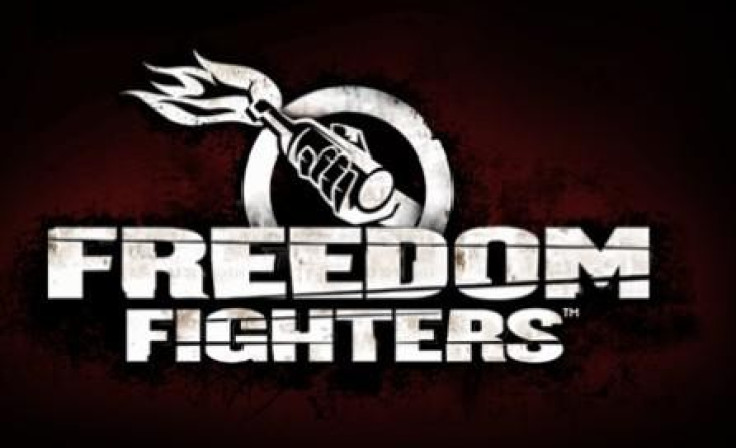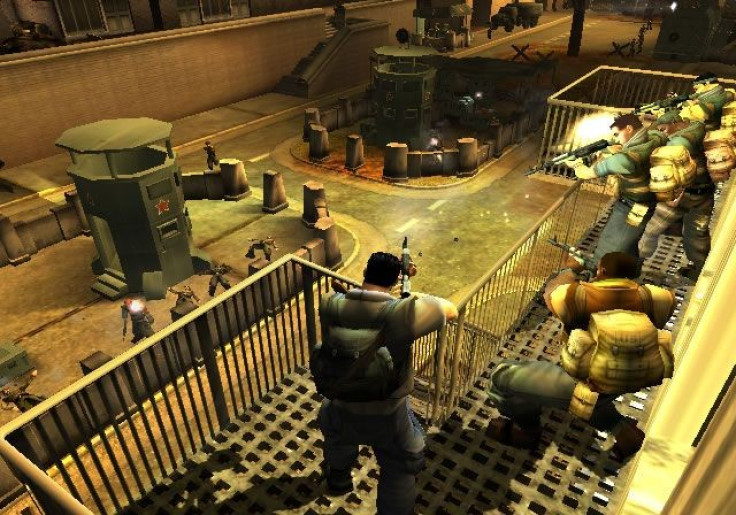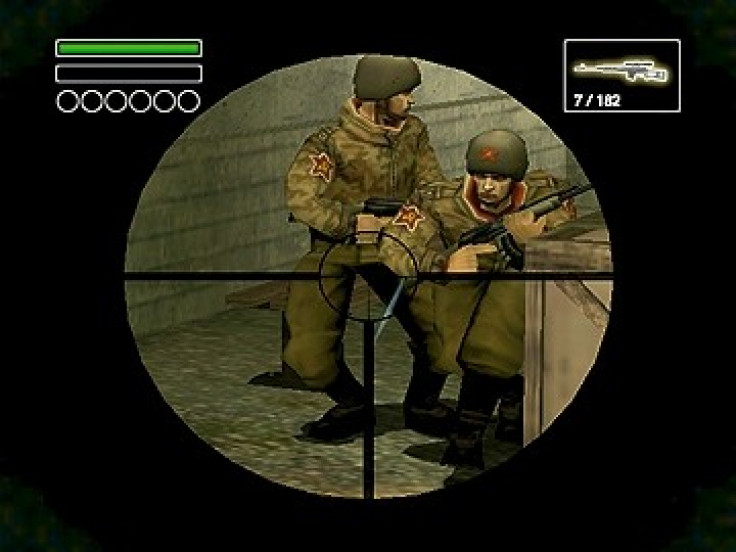Why Games Matter Blog - Freedom Fighters, My Favourite Game
A blog dedicated to big issues affecting the games industry
Freedom Fighters, My Favourite Game - Why Io Interactive's forgotten squad shooter still matters

Do you remember 2003? Of course you don't, nothing happened then. And besides it was ages ago. At least fifteen years ago. There were no iPhones; Harry Styles hadn't been invented; if you said 'Facebook' people probably thought you meant something like this:

No, 2003 was a really bloody boring year as far as most things were concerned. Except for games, of course, because it was when Freedom Fighters came out.
Launching on 26 September, 2003, Freedom Fighters was a kind of afterbirth to the Hitman series; it used the same engine, was made by the same people, but for some reason never managed to become even half as popular. The plot centred on a ragtag bunch of American rebels, fighting off an invasion from the Soviet Union, which, in this re-imagined history, had become the world's leading superpower after beating the US to inventing the atomic bomb. Combat was squad based, guns were many, and the story was ludicrous. On paper, Freedom Fighters was a turd.
I bought it anyway (or at least my mum did because she was nice like that) and played it beginning to end in one night. First impressions were...meh. Of course, I was thirteen years old at the time and therefore an idiot, but nevertheless, Freedom Fighters was not initially remarkable. Friends who I've lent it to since have said the same; despite lengthy conversations about Freedom Fighters in the pub, and my drunken assurances that its "the bes' *hiccup* game ever" my pals remain unconvinced, often returning it to me after a couple of days and some pretty good excuses.
"It's aged, it's a bit clumsy" they say, and I can't argue. Freedom Fighters is more than nine years old; in computer game terms, it's the equivalent of a silent film. But even sober, I still think it's the best game ever made. Why? I don't hear you ask, because you're reading this days later, in your head and I'm not there: Here's why.
An ideal world
We talk a lot today about "gameplay", and how "gameplay" will, in an ideal world, somehow represent a game's themes and story. Look at pixelated masterpiece Passage: You play as a virile young man, steadily aging as he side scrolls a la Mario from one end of the game to the other. Along the way, obstacles get harder to navigate (ostensibly illustrating how life gets tougher as you get older) and you meet a wife, who doubles the amount of points you get. It's a short but powerful demonstration of how playing a game can tell a game's story; Freedom Fighters pulls a similar trick, but on a much larger scale.
Guns felt awkward and unwieldy; on the PS2, aiming down the sight was mapped to the L3 button, meaning that moving and firing at the same time was difficult to master. Like your character, a plumber from Brooklyn, you weren't very good with guns: The controls prevented you from ever feeling too comfortable with shooting people.
You felt intimidated, is what I'm saying; cack-handedly pointing your stolen AK at a troop of commando rolling, armour plated Soviet troops, it was impossible not to feel outmatched. And so you should have: If Homefront made one big slip up (and it didn't, it made loads) then it was giving players enough guns, ammo and military training to let them rival the Korean invaders. Freedom Fighters made no such mistake; the rickety weapons meant you always felt like the underdog.
Gameplay as story, story as gameplay; you remember, all that clever guff I was talking about earlier? Freedom Fighters' fumbly control layout was a smart way of keeping you in the mindset of your character, and making sure you didn't do anything to disrupt the premise. Instead of charging into battles headfirst, you were encouraged to use sneaky, guerilla tactics. And the game played to that idea. Your relative uselessness in combat notwithstanding, Freedom Fighters' levels were giant, sprawling, faceted things with several routes in, and out, and up the Soviet flanks. A great early example is the hotel. Attack it from the front, straight away and you were liable to get more holes in you than the plot of Looper. But if you took your time, planned your assault, and sabotaged a few supply dumps, you could saunter into the front lobby with only minor resistance. Let me explain.
Warzone
Levels in Freedom Fighters were interconnected: Blowing up the helipad during the docks section meant you wouldn't get shot at by helicopters at the fire station. You could dip in and out of them at any time, too; a consummate Freedom Fighter would stealthily bomb a refuelling station, before slipping back into the sewers to cause trouble elsewhere. Once all the prisoners had been freed, the supplies had been looted and the vehicles had been sabotaged, they would launch their attacks proper, capturing Soviet strongholds and finishing the levels. Aside from being a revolutionary concept in and of itself (this was 2003, remember) this kind of layered, malleable level design thickened Freedom Fighter's atmosphere. Like in Hitman, where you were urged to explore, probe and snoop around, Freedom Fighters made you feel like an interloper, and the effect was twofold. Not only did it up that sense of vulnerability, of needing to plan and watch your back, it turned New York City into a warzone.

Like your avatar, you were seeing streets and buildings in a different light under Soviet occupation: A restaurant was no longer a restaurant, it was a potential spot for an ambush; high schools were incredibly dangerous, their tight and labyrinthine corridors making for some vicious fighting. It felt familiar and alien at the same time. These were recognisable locations, but you were forced to see them in a different way. It actually pains me to type this, because I'm about to sound like a complete t**t, but it did, truly, form cognitive consonance between you and your character (ouch).
Ad-hoc
I want to wrap this up soon, in fear of sounding exactly like I do when I've had a few Babychams and the conversation's turned to games. But before I call it a night, I ought to mention Freedom Fighter's masterstroke. Again, it's tied to controls, specifically the way you ordered around your teammates.

Now, the only other thing that happened in 2003, as I remember it, is that around summertime, SOCOM: US Navy SEALs came out. A squad shooter, like Freedom Fighters, it was a great example of how not to do AI comrades. Telling your team what to do meant traipsing through four, or five different menus. You had to stop, open the commands list; pick which team you wanted to talk to, pick whether you wanted them to attack or defend; pick how, when and where to attack or defend; etcetera etcetera. It was all done in real-time, too, so while you were busy ordering your squad to get in cover and hide, the baddies had found you, killed you and boasted about it on Myspace.
Freedom Fighters was having none of that. If you wanted your band of rebels to attack, you pressed triangle, if you wanted them to defend, you hit square; if you wanted them to follow you, you tapped circle. And that was it: The game's ultra-brainy AI did the rest. And again, it had multiple bearings on the experience as a whole. As a rebel leader, with no army training, it followed that your tactical know-how would be basic: Attack, defend; follow. It's exactly the kind of plucky, ad-hoc form of fighting that you would expect from a guerilla army.
On top of that, it gave your teammates character. SOCOM's SEAL team droids couldn't so much as walk without your double back slash sayso.exe; Freedom Fighters was a lot less robotic. The cumbersome menus that hampered other squad shooters were boiled down to something much more organic and tactile, and your troops reacted in kind. Tell them to defend, and they'd fan out and set up blocking positions; ask them to follow, and they'd wait for cars to go past before crossing the road, or lag behind to give cover to rescued hostages. Despite requiring more coding, no doubt, Freedom Fighters' rebels felt more like real people than in any squad shooter that came before. When they died, which they often did, it was sad; I'm tempted to say it will never be beat in that regard, but I'm still hoping for a Freedom Fighters 2.
Enduring achievement
Yes, because despite its sheer ruddy brilliance, Freedom Fighters proved less popular than the decision to rename Coco Pops to Choco Krispies. The game sold less than 300,000 copies, and Io Interactive has refused to comment on any sequel rumours since.
But in case the last fourteen-hundred words hasn't convinced you, Freedom Fighters is a remarkable game, my favourite game. In a world where AAA titles are ruled out as artistically irrelevant, Freedom Fighters stands up as a big budget action epic with very progressive ideas. Before Bioshock, before Passage; before the games as art discussion had really started to appear in mainstream writing, Freedom Fighters mixed fun, and innovative gun and squad play, with atmosphere, characterisation and plot. It wasn't so trite as to say that your actions changed the narrative - Freedom Fighters had the confidence to stand by its cutscenes - but your willingness to engage with the game's nuances, and learn its mechanics deepened your relationship to its thematic conceits. Now, almost ten years later, I can't think of many big studio games that have achieved the same thing, and managed to hide it so well behind appealing action beats and explosive spectacle.
In fact, that's the game's most enduring achievement; look up any review of Freedom Fighters, and it'll heap praise on the violence, the explosions and Jesper Kyd's orchestral score. Those things are all there; as a straightforward third-person shooter, Freedom Fighters is a complete blast.
But to me, it's more than that, and that's not just the nostalgia or the WKD talking. I'm a staunch defender of AAA games as art, and Freedom Fighters is still my most powerful weapon. As a flat out, explosive action game, it precedes Call of Duty; as a pertinent example of how player performance can inform the developer's narrative, it comes before Skyrim, Fallout 3 and The Walking Dead.
Freedom Fighters is my favourite game; 2003 was a good year.
© Copyright IBTimes 2024. All rights reserved.






